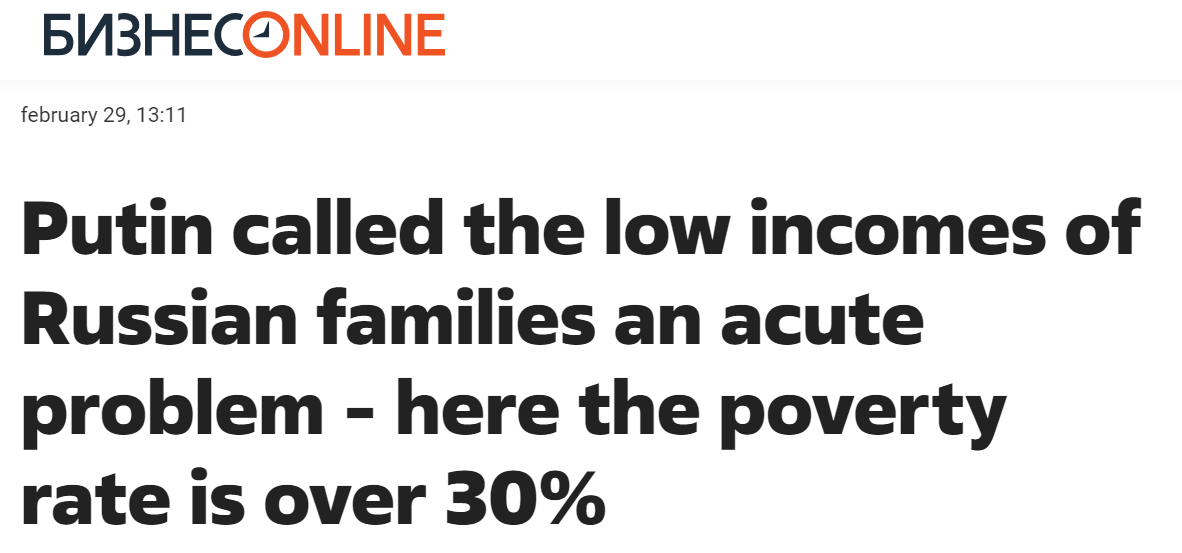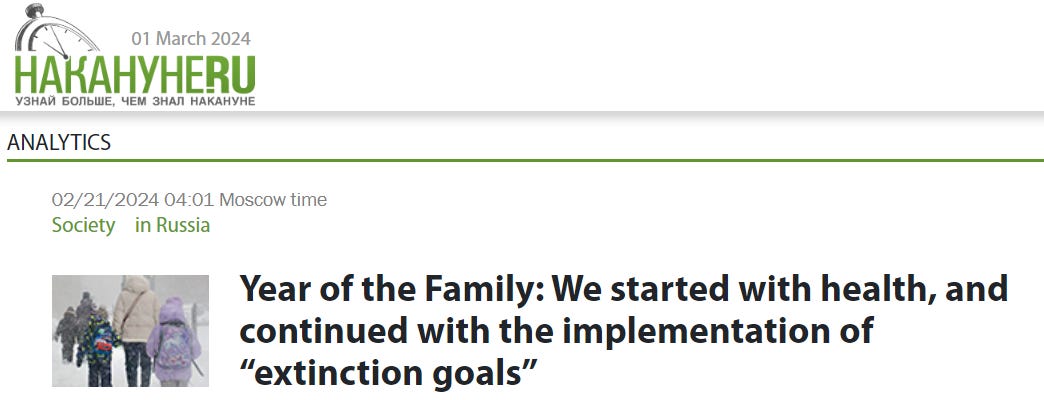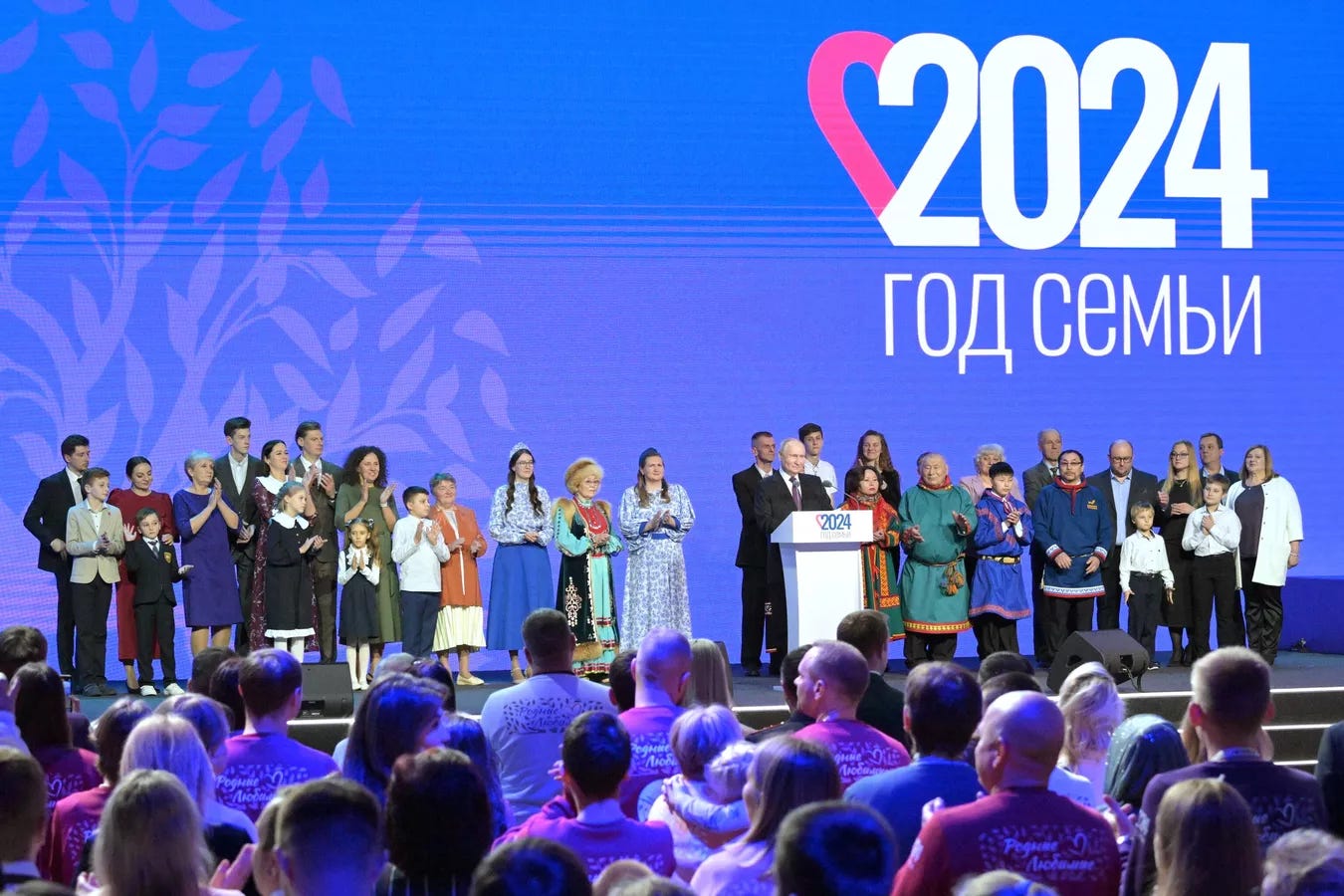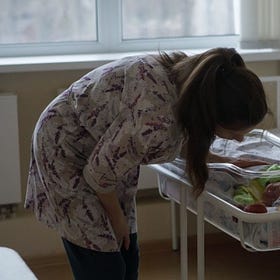Russian President Vladimir Putin on Thursday announced the launch of a new federal program to reduce poverty, with special attention given to improving living conditions for large families.
Putin said the initiative would aim to reduce poverty among large families to 12% by 2030. The poverty rate for large households (defined in a recent presidential decree as families with 3 or more children) is currently more than 30%.
In the third quarter of 2023, Rosstat calculated the poverty line at 14,392 rubles ($158). The threshold is slightly higher for people in the workforce (15,592 rubles) and lower for children (14,152 rubles) and pensioners (11,876 rubles). A large family is considered low-income if the total household income, divided by the number of people in the family, is below the subsistence level established in the region of residence.

Russia’s president also instructed his government to allocate at least 75 billion rubles in additional funding for regions with low birth rates. In addition, he proposed that a maternity capital program set to expire in 2026 be extended at least until 2030.
In autumn, Putin declared 2024 as the Year of the Family in the Russian Federation, giving “family protection” increased attention.
While aspects of the Year of the Family have been welcomed by conservative/patriotic commentators, the initiative is already facing criticism for falling short of the radical policy U-turn that some were hoping for.
A new approach to demographics?
In November, Russian President Vladimir Putin signed a decree on “popularizing state policy in the field of family protection and preservation of traditional family values”. Declaring 2024 the Year of the Family, Putin appointed Deputy Prime Minister Tatyana Golikova as chairman of a committee tasked with organizing a “plan of main activities” for the upcoming year.
Some of the biggest names in public health and digitalization joined Golikova’s committee, including Health Minister and former WHO Executive Board member Mikhail Murashko, RT editor-in-chief Margarita Simonyan, and head of the Ministry of Digital Development Maksut Shadayev.
Golikova, who has no children of her own, has been shaping demographic policy in Russia for more than a decade—with troubling results.
Her appointment as chairman of the organizing committee of the Year of the Family “raises doubts among a number of experts that family policy will somehow change,” Nakanune.ru wrote on February 21.
Katyusha.org was similarly displeased by her appointment. “The implementation of the [Year of the Family] will be under the personal control of Deputy Prime Minister Tatyana Golikova, whose activities cannot be called pro-family,” the conservative outlet wrote in January.
As Minister of Health and Social Development (2007-2012), Golikova urged Russians to shield themselves from “swine flu” by taking a drug called Arbidol, which had been placed on a list of obsolete medications with no proven efficacy. Manufactured by Pharmstandard, a drug company owned by a friend and business partner of Golikova’s husband, Arbidol was also purchased in bulk for Russia’s federal reserve stock of medicines.
Golikova was then put in charge of managing state taxes as the head of the Accounts Chamber (2013-2018). In May 2018, she was appointed Deputy Prime Minister for Social Policy and given the task of digging Russia out of its growing demographic hole.
Golikova projected that under her supervision, Russia would begin to reverse its population decline within five years: “We expect that the negative trend, which is now emerging due to natural population decline, will begin to change in 2023–2024,” she said in January 2019. That year, the country’s natural population decline reached 259,000 people—a loss of life that hadn’t been recorded in more than a decade.
In April 2020, she was made co-chair of the Government Coordination Council to Control the Incidence of Coronavirus. By the end of 2021, the Russian government had spent tens of billions of rubles on acquiring more Arbidol, which had been placed on a list of approved drugs for treating the “novel coronavirus”. (Arbidol was removed from the Health Ministry’s list of approved Covid medications in September 2021 and replaced with remdesivir.)
Russia achieved a demographic anti-record in 2021: The country suffered a natural population of decline of over 1 million people—a loss of life not seen since the end of the Great Patriotic War.
In the same year, Golikova was crowned the “queen of death” by Yuri Krupnov, the Chairman of the Supervisory Board of the Institute of Demography, Migration and Regional Development.
Questions about benefits
At the opening ceremony of the Year of the Family, held on January 23, Putin announced that he had signed a decree defining all families with three or more children as “large”. Previously, the regions decided how to define a “large” family, which meant that households could lose this status, and the corresponding benefits, if they moved to a different part of the country.
While benefits vary by region, large families in Russia are entitled to preferential mortgages, tax refunds, free school meals, and discounts for public transport, among other benefits.
The decree also contained language that sparked criticism and confusion. Putin’s order called for the creation of a unified digital database for large families in Russia—a provision that did not sit well with conservative commentators.
Despite promising families of three or more children with “indefinite” status as a large household, the decree also stipulated that social support measures to large families would be carried out “until the eldest child reaches the age of 18 years or the age of 23 years, subject to his full-time education.”
“Indefinite status for families with many children, with benefits that end on the eldest’s 18th birthday? I’m sorry, but who needs it then?” popular conservative activist Alexandra Mashkova-Blagikh wrote on Telegram.
First Deputy Minister of Labor and Social Protection of the Russian Federation Olga Batalina said on January 26 that Putin’s order secured “indefinite” status for large families, as well as certain benefits regardless of the age of the children.

But questions about whether “indefinite status” translates into “indefinite benefits” remain, with even state media suggesting that some support measures may depend on the age of the eldest child.
Legislative initiatives
Lawmakers are also working to achieve the goals of the Year of the Family. On January 24, State Duma deputies from the Communist Party submitted a bill on the abolition of personal income tax for large families.
Another proposed law would give large families a plot of state-owned land. Both bills—along with several other draft laws aimed at helping Russian families—are still under consideration.
In February, Putin signed a law that prohibits an employer from dismissing a single parent with a child under 16. Previously, the law banned dismissal of a single parent with a child who was 14 years old.
Other initiatives have been more symbolic in nature.
To mark the start of the Year of the Family, first deputy chairman of the State Duma Committee for Family Protection, Tatyana Butskaya, proposed making January 23 the Day of Large Families in Russia, and State Duma Speaker Vyacheslav Volodin encouraged deputies to “start with themselves” to set an example for creating large families.
“Demographics is where we are not yet successful”
With ten months left in 2024, it’s far too soon to judge whether or not the Year of the Family will improve socioeconomic conditions in Russia. But without radical policy changes, reversing Russia’s demographic crisis will be a near-impossible task.
In January, Rosstat calculated that the population will drop by 12 million people over the next 20 years, with Chechnya and Dagestan becoming leaders in natural population growth.
While the annual decline in natural population has slowed when compared to years like 2021, Russia continues to record distressing socioeconomic anti-records.
2023 broke previous records for the number of divorces, while the birth rate plummeted to levels not seen since the 1990s.

Speaking to reporters last year, Kremlin spokesman Dmitry Peskov acknowledged that “demographics is where we are not yet successful”, adding that there was no “panacea or magic pill” that would offer an immediate solution to the problem.
Patriotic voices inside Russia contend that the crisis facing Russia is the result of years of government inaction. Andrei Tsyganov, member of the Public Council under Roskomnadzor, chairman of the expert Institute of the Public Ombudsman for Family Protection, and editor-in-chief of Katyusha.org, said in a recent interview that the Russian government “did not notice” the needs of families for the last three decades.
“Everyone was busy with global deals, transatlantic corridors, and [family protection] was on the periphery of their consciousness. It is no coincidence that in the same Duma, family politics was considered the domain of opposition parties, apparently because the ruling nomenklatura did not think it was important,” Tsyganov said.

There is still hope that things could change. While highly critical of government’s approach to demographics, Nakanune.ru noted that the Year of the Family offers the possibility of a departure from unsuccessful socioeconomic policy:
The prospects for the Year of the Family are good if you start with the basics—information policy, the spiritual component—and then change economic approaches, develop the social sphere, which, of course, cannot be limited to one year, but begin universal changes that will lead the country out of the state of “extinction”.
It’s possible in 2024, because it’s also an election year. Experts hope that after the elections, the personnel policy among legislators, who are making insufficient efforts to create a favorable environment for families, and do not ensure population growth, will be revised.







Lol I just sent a link of your poverty article to Alex blog where he was saying it's a Western issue... Russia has the same issues but nobody wants to know?
https://alexkrainer.substack.com/p/exploring-the-root-causes-of-wests?utm_source=%2Finbox&utm_medium=reader2
Or they can just so it like the west, import huge numbers of 3rd worlders and claim there is population increase in the statistics